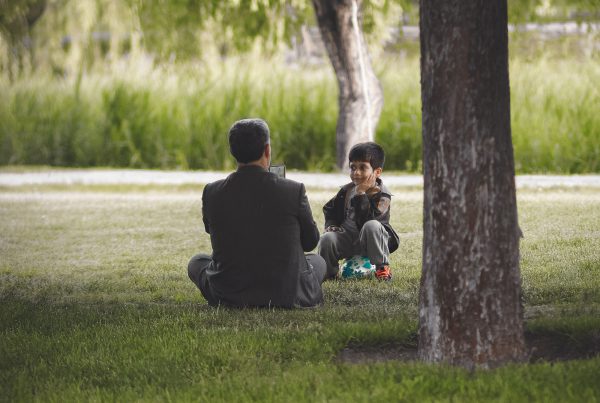When August rolls around, and you think about all the young, straight-out-of-highschool college freshmen, you most likely consider how nervous, anticipatory, and excited they all must feel. Some kids may have traveled across the country to an unfamiliar place, some are leaving all their friends and family behind for the first time, and no matter the case, the transition into college can be a very overwhelming time. With these kids being thrown into a sea of new faces, new routines, and a new home, it can be expected that there will be a period of adjustment to get situated and acquainted. Thankfully, there are lots of resources for them to feel less alone. Orientation nights and ice breaker activities, new people to run into in the dorm hallway, and new student programs are planned to make the adjustment more manageable. However, what many of us do not consider is how this transition can be a difficult time for parents as well. For some, it is the first time the house has been quiet in 18 years, or the first time their children have spent more than a week away from home. Whether it is your first or last child leaving the nest, a major life change like this can be very, very hard. Know, however, that what you are feeling is normal, and you are not alone.
Give Yourself Grace
As a parent, it may feel as though time has crept up on you when your child finally leaves for college. From the time children enter school, they are taught to work hard in school so that they get the best chances at getting into college. And you have been there to encourage them, push them, and support them in their goals since that time. You put all this effort into helping them with their homework, driving in the school carpool, coaching their little league games, and supporting them in their extracurricular activities with the hope that one day they might go to college and make a life for themselves. College may have seemed like that ‘end-goal’, that goal that would always be far away in time. And then suddenly, the time for them to leave comes, and a lot of emotions may rise to the surface.
Here is what you must keep in mind: as much as it is a transition for your children, it is also a transition for you. Your full-time job has been to take care and worry about your children since the day that they were born, and it can feel strange when it feels like you are handing the reins over and letting them take the lead. It can be extremely emotionally confusing, because you feel so proud and excited for them, but you may also feel sadness and anxiety about not being able to be there for them all the time. This is completely normal, and you don’t have to feel ashamed or embarrassed to feel separation anxiety when such a major life change is happening for you and your family. But now you may be wondering, what exactly is separation anxiety, and how can I help myself feel better?
Separation Anxiety vs. Separation Anxiety Disorder
When kids go off to college, it is normal for them to have feelings of anxiety and homesickness. On the other hand, it is normal for parents to feel sadness, loneliness, and even grieve when their child leaves for college. These are common symptoms of separation anxiety, which is defined as feeling anxious or nervous when separated from a loved one. While the American Psychological Association (APA) recognizes separation anxiety as a common experience felt by young children between the ages of 6 to 10 months, it is also completely normal to experience this type of anxiety during major life changes such as this.
Some common symptoms of parental separation anxiety are:
- Difficulty concentrating
- Feeling heightened feelings of anxiety or sadness
- Fear that something bad may happen to your child when they leave
- Following your loved one around the house
- Excessive worrying
- Fearing the unknown, experiencing a loss of control
- Feelings of loneliness, not knowing what to do now
- Sleep disruptions
- Headaches, stomachaches
More extreme symptoms that you may want to watch out for are ones such as:
- Obsessive need to know where your child is at all times
- Panic attacks, extreme feelings of anxiety
- Catastrophic thinking
- Feelings of extreme loneliness and isolation
- Headaches, stomachaches, nausea
Separation anxiety becomes a more serious issue of separation anxiety disorder when symptoms are no longer age-appropriate and more extreme. Separation anxiety disorder is defined by the APA as having developmentally inappropriate, consistent, and extreme anxiety about separation from loved ones or home. To diagnose this condition, the DSM-V identifies eight symptoms of separation anxiety disorder. They are summarized here as:
- Excessive distress when anticipating or experiencing separation from loved ones
- Excessive worry about possible harm to, or loss of loved ones
- Examples include: sickness, injury, disasters, or death
- Excessive worry about experiencing an event that may cause separation from a loved one
- Examples include: getting lost, being kidnapped, accidents
- Consistent unwillingness or refusal to go out due to fear of separation
- Excessive fear of or reluctance about being alone/being without a loved one at home or other settings
- Consistent reluctance or refusal to sleep if they are away from home or from a loved one
- Persistent nightmares that include the theme of separation
- Frequent physical complaints when they anticipate separation or are separated from loved ones
- Examples include: headaches, nausea, or vomiting
These symptoms must persist for at least 6 months in adults, cause notable impairment to normal functioning, and cannot be explained by other diagnoses. Additionally, it is reported that up to 21% of college students suffer from the disorder, and it is currently unknown how many parents and other adults may also suffer from separation anxiety disorder.
Of course, it is completely common and expected that a parent should feel excitement, worry, pride, anxiety, sadness, and loneliness when their child leaves for college. With that being said, if these feelings start to become very extreme, and you begin to feel as though your daily life tasks are suffering because of these emotions, it may be a good time to seek counsel or advice on how to cope.
How to Ease Separation Anxiety
Make Technology Your Friend
Thankfully, we live in the age of Facetimes and Zoom, and connecting with loved ones is easier than ever before. A big part of dropping your child off at college is the worry that you will no longer be able to see them, talk to them, or be up to date with their lives anymore. That could not be further from the truth! With how tech-savvy our current society is, there are so many ways to feel connected. Being able to video chat is a very fulfilling way to feel like you are in the same room as your loved one, even from hundreds or thousands of miles away. If anything, you may realize that you are talking to your child a lot more than when they were home. They will be experiencing so many new things in their new environment, so rest assured that there will always be new conversation topics and phone calls to be had. Additionally, your child will more than likely be calling or texting you all the time for all sorts of reasons since this is such a big transition period for them! From doing laundry, to using kitchen appliances and more, they will still need your reassurance and you can still be a huge part of their life at college.
Send Care Packages
If you are struggling with being unable to provide or care for your child from afar, sending a care package is a great way to send a bit of home to your college student. With the busyness of new classes, clubs, and friends, a lot of students are unable to go shopping or buy small items that may make them feel more comfortable. Some items that you could add to a college care package include:
- Their favorite snacks
- Wall posters/room decor
- Face masks
- Lounge wear
- Vitamins
- Blankets
- Stress ball
- Portable speaker
Plan for Visits and Breaks
When you spend a lot of time apart from your child, it will make the time you do have together all the more special. To ease the stress of being separated, it may relieve you to plan a weekend to visit campus and spend time with your student at their school. A lot of universities might hold Parent’s Weekends, which are specifically held to introduce you to how your student has been spending their time on their campus. This could be a great opportunity for you to ease your mind about all the unknowns of this new place, and also serves as a wonderful chance to bond with your child at their new school. In addition, you can put your energy into planning what kinds of activities or favorite foods you may want to make for your student when they come home for breaks. Creating a space that is extra welcoming and familiar to your child will be an amazing experience for the whole family, and breaks will be a time that everyone will look forward to every year.
At the end of the day, the separation anxiety you feel when your child leaves for college is completely normal. It shows how much you love your child and want to support them. You know you are a good parent because of how much you want the best for them, and just keep in mind that these growing pains will not last forever. The time apart from your child may be a great chance for you to dive back into your own passions, relationships, and interests that may have taken a back burner while you were raising your children. Just keep reminding yourself that they will always have a home with you, and you are always just a phone call away. You will all get through this together!







